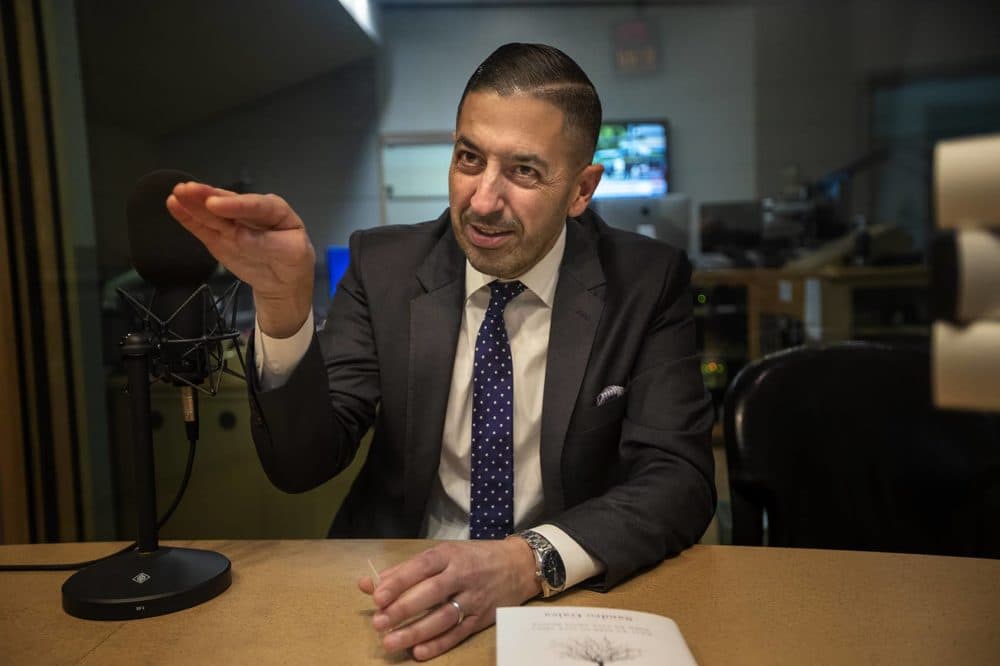Advertisement
In His Book, 'Well,' BU Public Health Dean Urges A Collective Approach To Health
Resume
Blind Willie Johnson was an early 20th century street performer who had a short career recording songs. But the influence of his rough, powerful voice and guitar style has played out in blues music for decades.
It's believed Johnson was blinded in a domestic violence incident when he was 7 years old. As an adult, his house burned down. With no money to relocate, he lived in the ruins of his home, sleeping on a damp bed. Not long after, he contracted malaria and died.
And so, the dean of the Boston University School of Public Health, Dr. Sandro Galea says, Johnson's life carries lessons beyond music.
In his new book, "Well," Galea explores how he thinks we need to change the way we talk about, and thereby improve, the nation's health.
Galea told WBUR's All Things Considered host Lisa Mullins the story of Blind Willie Johnson is a perfect starting point.
Interview Highlights
Dr. Sandro Galea: The reason the story is so compelling is because it pushes us to realize it was not just malaria that killed [Blind Willie Johnson]. It was domestic violence. It was homelessness. It was poverty. It was racism, and it was access to care. So it makes it clear that of course we need to pay attention to treatment. We need to pay attention to malaria. But if we just do that, it's not enough.
Today we have issues about where we live, about the air we breathe, the water we drink. We have issues around gender equity. We have issues around violence. And all these issues are the issues that shape our lives today, making us all Blind Willie Johnson.
On his observations about health while working as a primary care and emergency medicine physician:
You realize very quickly that patients presenting to you are there because of a medical condition, but that medical condition is the product of their entire life. That if you see somebody in middle age who is a certain number of pounds overweight, who as a result has osteoarthritis in their knee, the question is yes, the knee is the problem. But the real problem is, why has that person not been exercising? Why has that person's diet been the way it is? What kind of food has she had access to? What kind of parks has she had access to?
... As a child, your patterns for your life are set. It starts with, what kind of education are you getting? How literate are you about what behaviors you need to have to promote your health? How much attention are your parents paying to you? Which, of course, [this] depends on how much money they have and how much time they actually can spend paying attention to you. What kind of college you go to is determined by the extent to which you had the right mentoring, right environment, going through high school.
On collective responsibility for health:
One can look at it from a value point of view, which is that we value our collective health — so I care about your health and you care about mine. But we can also be very pragmatic and simply recognize that my health is influenced by your health. As a result, we collectively should invest in our health.
"... One of our challenges is that we keep mixing up health and health care."
Sandro Galea
Thirty-five years ago, America's health was in the top half of high-income countries. Today it's at the very bottom. Life expectancy here is lower than countries like Chile and Costa Rica. Opioids and suicide in the past couple of years have resulted in a further downturn. But there is no question that in the late '80s, early '90s we nationally took a turn toward a much more individualistic approach to determining everything. ... And that ultimately resulted in disinvestment from the collective resources that I'm talking about.
I would change the national conversation toward demanding health — toward saying we should be creating an environment that generates health. I think one of our challenges is that we keep mixing up health and health care. Health care is what we all want when we get sick. ... Health is the places we live, the places we work. The amount of money we have, the education we have, the food that's available to us. That's what generates health.
This segment aired on April 30, 2019.

